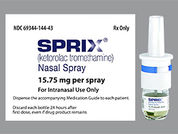Sprix
Ketorolac Tromethamine
What is Sprix used for?
Ketorolac is used for the short-term treatment (up to 5 days) of moderate to severe pain in adults, such as after surgery. Reducing pain helps you recover more comfortably so you can return to your normal daily activities. This medication is a nonsteroidal anti-inflammatory drug (NSAID). It works by decreasing inflammation, swelling, and pain.
CHEMICAL NAME
DRUG TYPE
Pain/InflammationSprix Prices
Searching for the lowest prices
What does Sprix look like?
View all Sprix Image Information (2)Sprix Frequently Asked Questions
Drug interactions may change how your medications work or increase your risk for serious side effects. This document does not contain all possible drug interactions. Keep a list of all the products you use (including prescription/nonprescription drugs and herbal products) and share it with your doctor and pharmacist. Do not start, stop, or change the dosage of any medicines without your doctor's approval.
Some products that may interact with this drug include: aliskiren, ACE inhibitors (such as captopril, lisinopril), angiotensin II receptor blockers (such as valsartan, losartan), cidofovir, corticosteroids (such as prednisone), "water pills" (diuretics such as furosemide).
Other medications can affect the removal of ketorolac from your body, which may affect how ketorolac works. Examples include cabotegravir, leflunomide, nitisinone, probenecid, teriflunomide, vadadustat, among others.
This medication may increase the risk of bleeding when used with other drugs that also may cause bleeding. Examples include anti-platelet drugs such as clopidogrel, "blood thinners" such as dabigatran/enoxaparin/warfarin, pentoxifylline, among others.
Do not use this medication with other forms of ketorolac, high doses of aspirin, or other NSAIDs.
Check all prescription and nonprescription medicine labels carefully since many medications contain pain relievers/fever reducers (aspirin, NSAIDs such as ibuprofen or naproxen). These drugs are similar to ketorolac and may increase your risk of side effects if taken together. However, if your doctor has told you to take low-dose aspirin to prevent heart attack or stroke (usually 81-162 milligrams a day), you should keep taking the aspirin unless your doctor tells you not to. Ask your doctor or pharmacist for more details.
IMPORTANT: HOW TO USE THIS INFORMATION: This is a summary and does NOT have all possible information about this product. This information does not assure that this product is safe, effective, or appropriate for you. This information is not individual medical advice and does not substitute for the advice of your health care professional. Always ask your health care professional for complete information about this product and your specific health needs.

